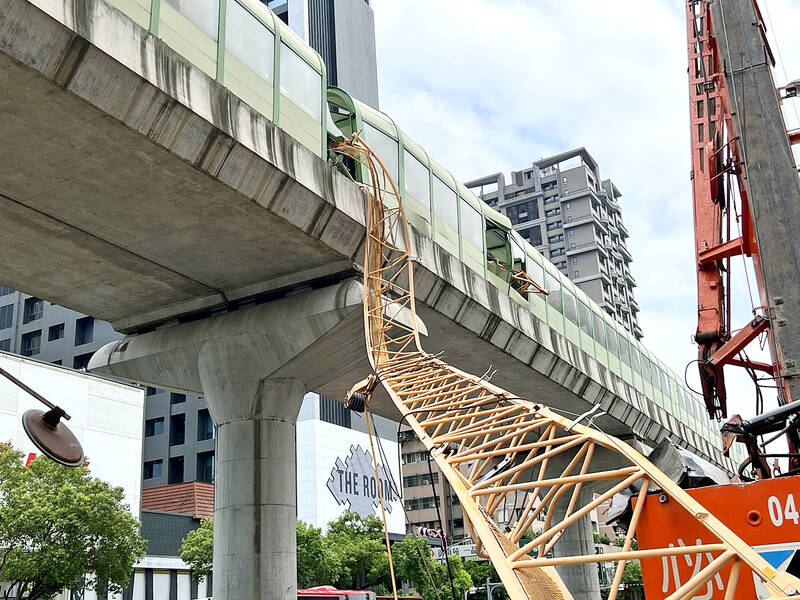Failure to properly operate a tower crane and a lack of clear measures for restricting or prohibiting construction on both sides of the Taichung mass rapid transit (MRT) system were the main reasons leading to a deadly crane collapse in May last year, an investigation conducted by the Taiwan Transportation Safety Board said yesterday.
On May 10 last year, an MRT train bound for the Taichung High Speed Rail Station crashed into a truss that fell onto the tracks between Feng-le Park Station and Daqing Station, killing one person and injuring 15.
The truss was later found to be from a construction site operated by Highwater Construction Co near the MRT route.

Photo courtesy of a reader via CNA
Contractors recruited by Highwater were using a tower crane to dismantle another tower crane that was used in construction, the board said.
“The crane operator might have tried to pull up a large truss diagonally, but the angle at which the operator made such a maneuver exceeded the limits of hoisting wires and truss lifting points, consequently twisting and breaking the truss,” the board said. “The truss eventually lost the support from the crane and fell to a road under the tracks, with part of it falling on the MRT line.”
The truss fell on the tracks at 12:27:03pm and the train departed from Feng-le Park Station at 12:27:29pm. At 12:27:31pm a security guard saw the truss on the tracks and waved his arms in a failed attempt to catch the attention of a staff member on board the train. The train hit the truss at 12:27:46pm, the board said.
Although a security guard saw the foreign object on the tracks, the guard failed to stop the train from leaving the station because there was no system on the platform for the station crew to halt the train in an emergency, the board said.
A staff member on board the train eventually detected the presence of a foreign object on the tracks and immediately asked the operations control center to stop the train, the board said.
The staff member also tried to use a key to open a board covering the train’s manual operating system to press the emergency brake button, but failed to unlock it in time, it said.
Investigators said that it would need about 15 to 16 seconds to unlock the board cover, but the staff member only had 12 seconds to do so after seeing a foreign object on the tracks.
The Measures for Prohibiting and Restricting Construction on Both Sides of the Mass Rapid Transit System (大眾捷運系統兩側禁建限建辦法) do not require contractors to conduct risk assessments and stipulate precautionary measures before they conduct high-altitude hanging operations in buildings, the board said.
Meanwhile, construction plans submitted by contractors working on-site in the proximity of important transportation hubs are only reviewed by agencies in charge of the projects, the board said, adding that there is no joint review mechanism between central and local government officials.
In Taiwan, contractors have no detailed procedures to abide by when they dismantle a tower crane, the board found.
Meanwhile, Taichung MRT Corp failed to set clear procedures to authorize its staff to halt trains in emergency situations, the board said.
It has neither standardized ways to communicate the need for trains to make a quick stop, nor track inspection procedures after incidents, it said.

The disruption of 941 flights in and out of Taiwan due to China’s large-scale military exercises was no accident, but rather the result of a “quasi-blockade” used to simulate creating the air and sea routes needed for an amphibious landing, a military expert said. The disruptions occurred on Tuesday and lasted about 10 hours as China conducted live-fire drills in the Taiwan Strait. The Civil Aviation Administration (CAA) said the exercises affected 857 international flights and 84 domestic flights, affecting more than 100,000 travelers. Su Tzu-yun (蘇紫雲), a research fellow at the government-sponsored Institute for National Defense and Security Research, said the air

Taiwan is to commence mass production of the Tien Kung (天弓, “Sky Bow”) III, IV and V missiles by the second quarter of this year if the legislature approves the government’s NT$1.25 trillion (US$39.78 billion) special defense budget, an official said yesterday. Commenting on condition of anonymity, a defense official with knowledge of the matter said that the advanced systems are expected to provide crucial capabilities against ballistic and cruise missiles for the proposed “T-Dome,” an advanced, multi-layered air defense network. The Tien Kung III is an air defense missile with a maximum interception altitude of 35km. The Tien Kung IV and V

Trips for more than 100,000 international and domestic air travelers could be disrupted as China launches a military exercise around Taiwan today, Taiwan’s Civil Aviation Administration (CAA) said yesterday. The exercise could affect nearly 900 flights scheduled to enter the Taipei Flight Information Region (FIR) during the exercise window, it added. A notice issued by the Chinese Civil Aviation Administration showed there would be seven temporary zones around the Taiwan Strait which would be used for live-fire exercises, lasting from 8am to 6pm today. All aircraft are prohibited from entering during exercise, it says. Taipei FIR has 14 international air routes and

Taiwan lacks effective and cost-efficient armaments to intercept rockets, making the planned “T-Dome” interception system necessary, two experts said on Tuesday. The concerns were raised after China’s military fired two waves of rockets during live-fire drills around Taiwan on Tuesday, part of two-day exercises code-named “Justice Mission 2025.” The first wave involved 17 rockets launched at 9am from Pingtan in China’s Fujian Province, according to Lieutenant General Hsieh Jih-sheng (謝日升) of the Office of the Deputy Chief of the General Staff for Intelligence at the Ministry of National Defense. Those rockets landed 70 nautical miles (129.6km) northeast of Keelung without flying over Taiwan,